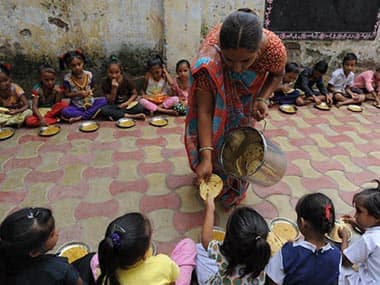[caption id=“attachment_1003027” align=“alignleft” width=“380”]  Representational image: AFP[/caption] by Gaurav Gupta and Nupur Kapoor Serving over 110 million children a daily meal is a mammoth task. While India is yet to achieve universal coverage there is no denying the sheer reach of the program and the audacity of its ambition. As is the case with many public schemes, administrators have been focused on volumes and not value when it comes to generating outcomes from a well-intentioned feeding program. A widely quoted sample study of recent midday meals served in Delhi suggests that 83 percent of the meals tested were of poor quality and did not meet prescribed nutritional standards. While some States such as Tamil Nadu do provide additional allocation for nutritious additions such as eggs, the Delhi results are seen as representative of the majority of meals served across the country. It is not surprising that the scheme is focused on scale given it is designed and implemented by the Ministry of Human Resource Development as an incentive for school enrollment and retention. While it also serves as a backstop for malnourished children, ensuring they get a hot meal, pushing for ideal levels of nutrition is neither part of the culture of the program nor its DNA. The good news is, even within its current framework, the scheme holds the capacity to deliver results that go far beyond enrollment and retention numbers. The key to realizing this scheme’s latent potential and fixing many of the quality issues is culture. Yes, we need more testing centers and consistent monitoring (India has just one testing centre!), better storage and cooking facilities, trained and aware staff and in light of recent inflation maybe an increased budgetary allocation, but such infrastructure fixes cannot exist in a vacuum. At its core, those who are interacting with children everyday, their families and the community, and the children themselves, need to care about food quality and nutrition. No centralized mandates and schemes to fix other schemes are going to work unless the end beneficiaries see and care about the value being delivered. The best way to achieve this uplift in quality is by developing a local intolerance for low nutrition and bad quality food. A majority of the school feeding programs across the world, including in countries economically poorer than India, incorporate nutritional education as part of the delivery mechanism. In Mozambique, for instance, mothers volunteer on rotation and cook in two shifts ensuring not just a well-cooked meal, despite the limited means at hand, but also a constant quality check. Now a global benchmark, Japan’s school lunch programme started off after World War II with just powdered skim milk and bread on the plate. Conceived centrally but delivered in a highly decentralized manner, it evolved quickly from being a buffer for at-risk children in times of extreme food shortages, to a system that now places the philosophy of promoting awareness about nutrition and healthy eating at the heart of its programme. Each of the over 20,000 elementary schools has dedicated lunch personnel to monitor meals and approximately 8,000 trained nutritionists who work across these schools not only teaching children more about what’s on their plates but also why it is good for them, thus enrolling them into their own health and wellbeing. Countless studies have shown how the lunch program contributed to Japan’s educational and economic productivity gains. These gains were not just from the meal itself, but how that knowledge and culture of nutrition went from the classroom into the home. From the outset, the Indian scheme failed to grasp the learnings from overseas experience. Ours is a number oriented meal program not a nutrition program. A focus on nutrition would mean a focus on quality. It would mean thinking about an efficient delivery system that can cater for minimum calorific values, protein and micro-nutrient content, adhere to safety standards on bacterial content and other contaminants and have the right monitoring checkpoints, both official and informal. We need to do this as a matter of urgency, nationally. The momentum on nutrition needs to be built on all fronts. The now ubiquitous self-help groups provide an excellent platform for awareness raising amongst women, especially mothers, on nutrition. Making mothers aware of nutrition and why it is integral for their child’s development and a shot at a better future, makes them instant guardians of what is being put on their child’s plate. This needs to be combined with policy measures that encourage community participation in making school feeding more than just calories on the plate, including decentralized procurement processes that allow purchase of perishable ingredients like vegetables from small local farm holders (creating increased local economic benefits and local accountability). Ultimately, the focus on nutrition needs to move from the school and into the home (as it did in Japan). This is the true unrealized potential of the scheme. The downstream benefits are immense. We have built the ability to reach the children, now it’s time to evolve the program into something that provides the type of quality that promotes real social equality. The authors work at Dalberg, a strategy consulting group focused on developing solutions for critical social development challenges.
The key to realizing this scheme’s latent potential and fixing many of the quality issues is culture.
Advertisement
End of Article
Written by FP Archives
see more


)

)
)
)
)
)
)
)
)



